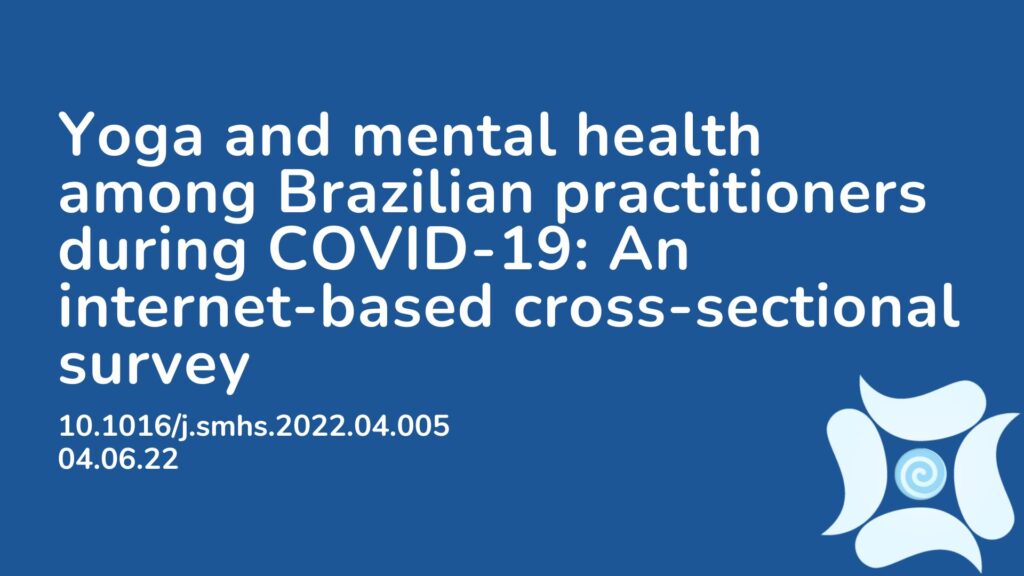Summary: Mental health disorders such as Anxiety and Depression are recognised as the leading causes of disability globally, however the impact of the COVID-19 pandemic related restrictions, lockdowns and isolation have made mental health even more of a challenge to all populations. On top of this, exposure to negative news and health information, a possible COVID-19 infection, lack of trust in authorities due to conflicting information, previous history of psychiatric disorders and unemployment were factors that considerably increased the levels of Anxiety, Depression, and stress for individuals during these past two years. Non-pharmaceutical measures to tackle these stressors such as Yoga are of utmost importance. Previous systematic reviews have indicated that Yoga can be considered an effective and safe treatment option for individuals with Anxiety and Depression, however, few studies show the impact of Yoga in correlation with the COVID-19 pandemic. Therefore, the current study aimed to verify the association of this practice with Mental Health disorders and stress levels among Brazilian yoga practitioners during the pandemic. The results showed that a higher level (average of time practicing and frequency) of Yoga practice was associated with better mental health outcomes during the COVID-19 pandemic. There are many mechanisms that explain the therapeutic effects of Yoga on Mental Health, such as positive modulation of the hypothalamic-pituitary-adrenal axis and a decrease of cortisol concentrations. Yoga has also shown to increase gamma-aminobutyric acid (an inhibitory neurotransmitter) levels in the brain. Since psychological stressors are associated with a pro-inflammatory state, the reduction of pro-inflammatory cytokines and increase of anti-inflammatory cytokines evident through the practise of Yoga also explains a therapeutic mechanism. These modulations reinforce the efficacy and benefits of Yoga practice for Mental Health and during stressful times, such as a pandemic.
Abstract:
This study aimed to describe yoga practice and verify its association with depression, anxiety, and stress during the COVID-19 pandemic among Brazilian practitioners. A cross-sectional anonymous online survey was conducted in all regions of Brazil using a snowball sampling strategy among yoga practitioners. A total of 860 participants (87% female, aged: 19–82 years) completed the survey. Sociodemographic data, lifestyle factors, yoga practice during the pandemic, and the Depression Anxiety and Stress Scale (DASS-21) scores were collected between July 9 and July 15, 2021. Overall, 9.5%, 9.3%, and 5.6% of participants exhibited some traits (mild to severe) of depression, anxiety, and stress, respectively. Hatha yoga (48%) was the most commonly practiced yoga style. In the adjusted analysis, a higher yoga experience (> 5 years) was associated with better anxiety (odds ratio; bootstrap 95% confidence interval: 2.42; 1.32, 4.49) and stress status (1.80; 1.06, 3.00) than beginners (< 1 year). Practitioners who reported higher time and days of yoga practice during the study period were more likely to show normal levels of depression (odds ratio: 2.56–6.49; p < 0.05), anxiety (odds ratio: 3.68–8.84; p < 0.05), and stress (odds ratio: 2.15–5.21; p < 0.05). Moreover, the maintenance of practice frequency during the pandemic was associated with higher odds of normal levels of depression (2.27; 1.39–3.79), anxiety (1.97; 1.25–3.10), and stress (1.97; 1.32–2.96). In conclusion, our findings indicated that a higher level of yoga practice was associated with better mental health levels during the COVID-19 pandemic.
Article Publication Date: 04.06.22
DOI: 10.1016/j.smhs.2022.04.005




